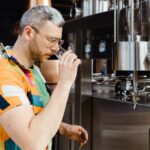Waterford Whisky, CEO and Renegade Rum, Founder: MARK REYNIER
TRL: Who is Mark Reynier?
My family business was wine importation into the UK. From 1980 onwards I bottled and distributed fine French wine, on my own account as a wine & spirit retailer in London. Then I started an independent bottling company for whisky before resurrecting Islay single malt distillery Bruichladdich in 2001. It was then I started the original Renegade to bottle other rums, before creating Waterford Distillery in Ireland in 2015, and then finally building Renegade Distillery in Grenada in 2019. I was brought up to understand the integrity of natural flavor, to trust and train one’s sense of smell, to seek out balance, harmony, and length. This is what we do at both Waterford Whisky and Renegade Rum.
TRL: What does the rum mean to you? What made you fall in love with rum and when did it happen?
As an independent bottler of whisky in the late eighties and nineties I had become increasingly frustrated by the diminishing volume of premium quality malts and looked for an alternative, a diversification: rum, at first, seemed to offer similar opportunities of fine spirit, venerable casks that once prevailed with whisky. However, frustrated as much by a lack of transparency and authority, as availability and variety, I decided to explore deeper and came to the conclusion that to achieve what I wanted I would need to start from scratch.
TRL: Three essential characteristics that define the rum according to your perspective.
Modern production values. Using sugar cane as the primary ingredient rather than the residue from sugar refining, means that the concept of terroir comes into play – the 3 dimensional interaction of micro-climate (with the emphasis on micro) with soil and topography. This concept requires traceability – the proof – which in turn demands transparency – the sharing – which combined, gives authority, something that one can truly believe in and get behind, a natural product of the land.
TRL: What is the most important contribution you have made in the rum industry?
Transparency. The Cane Code on the back label not only validates our Renegade concept but verifies the rum in the bottle itself. This is what we do; this is what we believe; this is how we do it. Hopefully we can demonstrate that there is more to rum than mere commodity supply, that rum can be taken as seriously as the finest single malts and cognacs, with a flavor profile as compelling as the production proposition. I guess with building a new, state-of-the-art distillery from a blank sheet of paper, combining whisky industry thinking with pioneering innovation and cane inspiration will be the catalyst that finally proves rum’s turn has come.
TRL: What is your favorite place for drinking rum?
Have you ever tried drinking a rum while in the very same field as the cane from which it was distilled? It’s a mighty, mighty powerful feeling – a natural, basic elemental connection.
TRL: Favorite drink + Recipe
I like to savor the flavor of single cane rum just like a single malt whisky: a dram, or in this case ‘a drum’, unencumbered, au naturel, with a little cool spring water (dilute to suit) to open up the flavor and mellow the ABV. Others prefer the cocktail approach and with all that natural flavor there’s a pretty big bang for buck – but my personal preference is to experience the spirit in its purest form.
TRL: Why is it important to educate the rum consumer?
Reliable information has been woefully scarce; a vacuum of knowledge, repetition of rumor, recycling of scant details. With as many countries making rum as there are interpretations of what rum is, together with the lack of rules or regulations, it is no surprise the waters are pretty murky. Some will prefer it stays that way – the industry narrative. The naissance of single malt whisky started with the pioneers, the guys that were there at the beginning back in the mid eighties and nineties. Then there was the Bruichladdich era, from 2001, when we opened the doors and explained our principles, shared how whisky was really made. Now there is a third generation, as well informed as the previous – but they want to know ‘why’ as much as ‘how’ by seeking out reliable information. It has to start somewhere.
TRL: Any tips to train the palate and taste a good premium rum?
Each to their own, but for myself and a Renegade ‘drum’ I recommend, above all, don’t rush it. Take your time. I use a decent sized tumbler, rocks glass, or any open, high capacity wine glass. Pour a good amount (you are going to be taking your time, right?) and nose it: really explore and rejoice in the cane bouquet, the complexity and profile and as the spirit oxidizes this aroma will develop and open up. Then add a drop of water. This will further enhance the flavor liberation so keep nosing and observing the extraordinary evolution in the glass. All this and you haven’t even drunk any! Then, ‘dilute to suit’ your palate: add more still spring water until you find the optimal ABV to match your mood, time of day, company… warmth, air, water – and time – will together act on the spirit in the glass to offer a rewarding, dynamic experience.
TRL: Is the commitment to sustainable development the key of success for the permanence of the rum industry in the world? Why?
Though sustainable development anywhere is of course desirable, the issues are still the same – energy, water and waste – I would wager not necessarily linked to the ‘permanence of the rum industry’. We had the chance to build a state-of-the-art distillery, the first one in our neck of the Caribbean in over a century: much has changed in that time and yet, bizarrely, yet some has remained the same, such as Biomass. Some technologies are qualitative such as temperature control that permits controlled fermentations for purity, stainless steel for hygiene; others are environmental like wastewater treatments and emission controls.
TRL: What are your next goals in the rum industry?
Spread the word of just how good cane rum can be, a true alternative as profound and complex as a single malt; as elegant and refined as a good cognac; as earthy and natural as rustic mezcal. In short, that there is much more to rum than meets the eye.
TRL: Why is the role of the bartender important in the rum industry?
Bartenders, understandably, are always on the lookout for novelty, in a neverending flavor of one-upmanship. Many will tell you that cocktail recipes of today no longer work when in reality it isn’t the recipe: it’s the spirits. They are not what they once were, being too commercially thin and insubstantial. Rediscovering the kaleidoscope of natural flavor, liberated by innovative fermentation, enriched by low and slow distillation, matured in good wood all taken together opens a whole new window for the disc jockeys of natural flavor.
TRL: What is your advice for new generations in the rum industry?
They say the definition of madness is repeating the same action over and over again yet expecting a different result. And the rum industry, forever the Cinderella, continues to do exactly that: something has to change…
TRL: How can people learn more about you? Website? Social media page?
Our website is a font of knowledge, both thought-provoking and informative articles, around rum distillation and what we renegades do in Grenada: www.renegaderum.com , and most of the usual social platforms:
http://instagram.com/renegaderum/
About The Author
Creative Director for EmpresasFH and Director of HOFFMANNdesign. Born and raised in Caracas, Venezuela, Mr. Hoffmann has been one of the most important designers for prestigious companies in South America, including Disney, Cartoon Network, Mattel among others.





